![]()
Two Years After the Blast, Lebanon is Still Struggling — But Still Standing
“The big problem in Lebanon is that it is not possible to tell the truth, to assume one’s responsibilities, to say: ‘Okay, we made a mistake, and we ask for forgiveness’… But one day the truth will reach us all.” — Bishop César Essayan, the Apostolic Vicar of Beirut, commenting recently on the events of August 4, 2020; the government investigation into the explosion in Beirut harbor has been suspended since December 2021
“Tomorrow [August 4] is the second anniversary of the explosion of the port of Beirut. My thoughts go out to the families of the victims of that disastrous event and to the dear Lebanese people: I pray that everyone can be consoled by faith and comforted by justice and by truth, which can never be hidden. I hope that Lebanon, with the help of the international community, will continue to walk the path of ‘rebirth,’ remaining faithful to its vocation of being a land of peace and pluralism, where communities of different religions can live in fraternity.” — Pope Francis, also commenting on the 2-year anniversary of the Beirut explosion during a General Audience in the Vatican on August 3, 2022
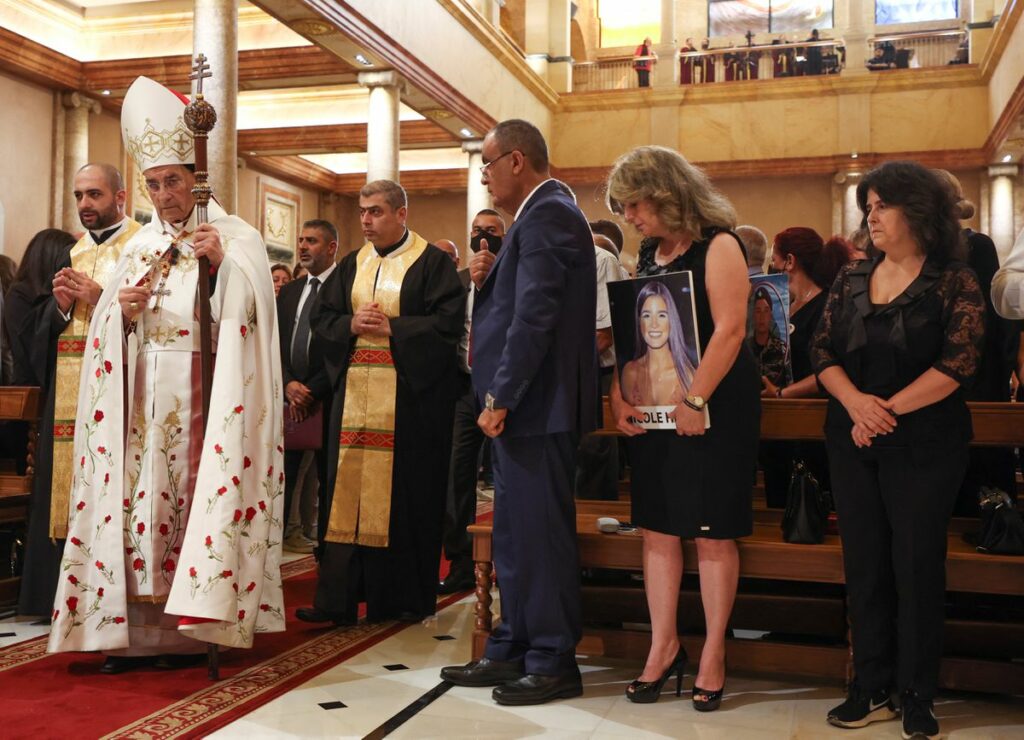
Maronite Patriarch Bechara Boutros Al-Rahi held a Mass in Beirut for families of the August 4, 2020 Beirut port explosion, on the 2nd anniversary of the explosion. [Source: Reuters/Mohamed Akazir]

Above, Bishop César Essayan, OFM, Conv., 60, (link) the Vicar Apostolic of Beirut, who has worked to support victims of the Beirut explosion for more than two years. He recently gave an interview (see below) stating that the people of Lebanon are experiencing “an oppression never before witnessed.”
Lebanon Report 2022, #8: Tuesday, August 2
Lead Story
Lebanon Marks Two Years Since August 4, 2020 Beirut Blast With National Day of Mourning
By Christopher Hart-Moynihan, Director, Friends of Lebanon Project (link)
For those who experienced it in the flesh, it was a harrowing “before-and-after” moment in their lives. For others, it has become a tragic symbol of Lebanon’s downfall. But one thing is certain: the explosion in the port of Beirut on August 4, 2020, two years ago now, was one of the most shocking events of our time.
The bare figures are tragic enough: 218 deaths, 7,000 injuries, roughly 300,000 left homeless in the center of Beirut. For those who were not there, it is difficult to grasp the sheer size of the explosion: the U.S. Geological Survey rated it as a seismic event of magnitude 3.3 on the Richter scale, akin to a minor earthquake. According to reports, the blast was heard and felt hundreds of miles away, in both Israel and Cyprus.
Yet in addition to these shattered lives and buildings, something else was lost on that day, something that belonged to the nation of Lebanon as a whole: a sense of security, of peace, and of hope for the future.
This is why, for two years now, the Friends of Lebanon have worked to bring back a small flame of hope, even if it is merely a lone light, flickering in the darkness.
As part of our efforts to keep this flame burning, we have tried to bring “short-term help” and “long-term hope” – “short-term help” through providing food boxes and water purifiers to the neediest affected families in Beirut, and “long-term hope” through helping more than 100 middle- and high-school students continue their schooling.
For two years, we have watched, listened, and tried to discern the best way that we could help, in the face of Lebanon’s many challenges. We have grieved all that was lost in the disaster, and then set to work to try to turn things around – and we will continue to do so, until Lebanon is once again a “message of peace.”
For all that we have done in this time, and all that we continue to do, we thank you, our readers, our supporters, and our friends.
***
Yet so much remains to be done. In an interview with Catholic news outlet Asia News, the president of Caritas Lebanon, Fr. Michel Abboud, said that the people of Lebanon are going “from one crisis to another.”
Fr. Abboud highlighted the extreme challenges Lebanon’s medical and educational systems are currently facing: “Every week, we hear that two or three people have died because they couldn’t get to a hospital, depriving them of the right to treatment… Many teachers have left and are out of work, because wages are low and they can’t pay for fuel or transport. The same goes for many students, boys and girls who dropped out in the last year because they cannot pay.”
The solution, he says, is only to be found in a collective effort. “We do not need large sums, but a small contribution from many people. The Lebanese people are accustomed to wars and suffering, but today trust between people has been lost and only faith in God seems to have remained.”
Finally, there is a feeling among many Lebanese that many of the details behind the August 4 explosion have been “covered up” and prevented from coming to light. The government’s investigation into the explosion has been suspended since December 2021, and no senior officials have yet been held responsible for the tragedy.
In a statement released on August 3 through the Office of the High Commissioner for Human Rights, a group of human rights experts from the United Nations called for the opening of an international investigation.
“This tragedy marked one of the largest non-nuclear blasts in recent memory, yet the world has done nothing to find out why it happened,” the statement read. “On the second anniversary of the blast, we are disheartened that people in Lebanon still await justice, and we call for an international investigation to be initiated without delay.”
On the 2nd anniversary of the explosion, thousands of protestors marched through the streets of Beirut — many of them relatives of the victims killed by the blast, all of them demanding answers. Some went to protest in front of the French embassy, calling for France to support an international investigation.
“What happened was not a mistake, it was a massacre,” said Stephanie Moukheiber, one of the protestors (quoted in an article from Reuters). “They destroyed an entire city.”
French President Emmanuel Macron has said that he proposed an international investigation, but that Lebanese authorities opted for a national one. “It is a sovereign choice that France and the countries that are friends of Lebanon have respected,” Macron said.
Hezbollah and its allies have opposed the probe since the judge leading it charged several Hezbollah-aligned officials. Hezbollah leader Hassan Nasrallah said on August 4 that “the solution is for this judge to step down and another judge with credibility to be appointed.”
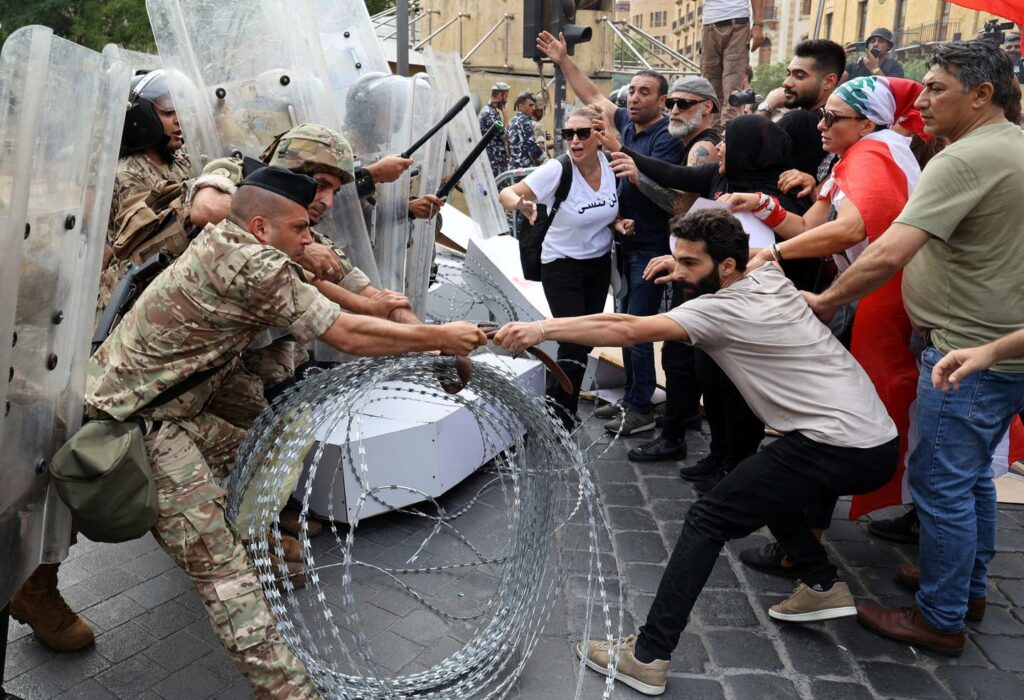
Protestors clash with police in front of the Lebanese parliament building during large-scale demonstrations held on August 4, 2022, in Beirut [Source: AFP/The National]
Lebanese President Michel Aoun Set to Leave Office on October 31
Three months after the Lebanese Parliamentary Elections on May 15, Lebanon is now awaiting its next major political event: the election of the next President. The current President of Lebanon, Michel Aoun, who has served since 2016, will be finishing his term on October 31, meaning that Lebanon’s Parliament must choose his successor within the next two months.
The election of a new President is likely to pose a huge challenge for the Lebanese political system. Though the President, according to Lebanon’s Constitution, must be a Maronite (Catholic) Christian, the selection of an individual who is acceptable to most of Lebanon’s various political and religious factions promises to be rather difficult. For an example of this, we can look to the presidential candidacy of Aoun himself.
Aoun, who is himself a Maronite and the leader of the Free Patriotic Movement (FPM) – a Christian political party – received supported in his 2014 bid for the presidency from Hezbollah – the dominant Shia bloc, backed by Iran – due to the fact that he had signed a “memorandum of understanding,” the Mar Mikhail Agreement, with Hezbollah leader Hassan Nasrallah in 2006. After two years, boycotts of the presidential elections by the Free Patriotic Movement and Hezbollah, and 46 rounds of voting, Aoun was installed as President in October 2016.
The Mar Mikhail Agreement when it was signed changed the political landscape of Lebanon. It was a political compromise between Christian and Shia parties that allowed the Christian FPM, led by Aoun, to become preeminent among the many competing Christian parties and eventually attain the presidency, and it further legitimized Hezbollah’s continued war with Israel and territorial control of southern Lebanon.
But recent developments have made it possible to imagine a future for Lebanon that is not dominated by Hezbollah and its Christian allies in the Free Patriotic Movement.
Lebanon’s parliamentary elections in May resulted in a surprising loss of the parliamentary majority for the Hezbollah-FPM alliance. Another established Christian party, the Lebanese Forces, won 19 seats to FPM’s 17 and Hezbollah’s 15 (FPM and Hezbollah, together with their allies, still hold a plurality in Parliament with 61 of the 128 seats).
It seems that, despite their many disagreements, the Lebanese people largely agree on one thing: much of the blame for Lebanon’s economic collapse, the August 4 explosion, and the ongoing political gridlock can be laid at the feet of the ruling alliance – Hezbollah and the Free Patriotic Movement, led by Aoun.
The political rhetoric of the Lebanese Forces indicates that their leadership would like to take the country in a completely different direction:
“Our project consists in part in a confrontation against the illegal armament of Hezbollah, its positioning in the Iranian axis, its violation of the Constitution, while we advocate neutrality and the rule of law,” Charles Jabbour, from the Lebanese Forces office, said.
“We will also lead a confrontation concerning the FPM, a Christian party, which for the first time in history, has adopted an anti-democratic, anti-sovereigntist and anti-constitutional line, while also damaging Lebanon’s relations with the international community,” he added.
While such a platform may seem attractive, its achievability is questionable. Whether the Lebanese Forces and other parties can actually form a majority to elect a new President who is not beholden to the Mar Mikhail Agreement remains to be seen.
This is how Firas Maksad, a Professor and Senior Fellow at the Middle East Institute, summarized the outcome of the parliamentary elections and the likely result of the presidential elections on Twitter:
“Setbacks suffered by Hezbollah & co offer greater opportunity for pushback against Iran in #Lebanon. Yet strategic shift remains unlikely in light of limited Western/Arab interest, the group’s enduring hold on its community, & the preponderance of its military power.
“More likely outcomes include fractured parliament & difficulty forming a gov, stalling IMF negotiations & reforms. Also, vacancy in presidency as Hezbollah employs pressure tactics to prevent election of a rival to the post come Nov.
“While Lebanon remains a fractured & complex polity, election results offer hope that potential for change exists. Majority of Lebanese don’t support Hezbollah & miserable status quo. But strategic shift requires a favorable regional & international context that doesn’t currently exist.”
***
Here below is a brief announcement about our pilgrimages in September to Lebanon, Sept. 17-25. If you would like to travel with us, there is still time — we would like to have you join us! —CHM
“Friends of Lebanon”
Pilgrimage to Lebanon
Urbi et Orbi Communications and Unitas: Friends of Lebanon are excited to announce that we will be going on pilgrimage to Lebanon this September 17-25.
During these days in Lebanon, we will spend time in Beirut meeting with religious leaders, including an expected meeting with Maronite Patriarch Bechara Boutros al-Rahi, 82.
We will also visit holy sites in and around Beirut, such as the monastery of St. Charbel, as well as spending three days in the astonishing Qadisha Valley, the “Holy Valley” of northern Lebanon and the heart of Lebanese monasticism (see image below).
This pilgrimage is open to all who have donated to the Friends of Lebanon initiative, but space is limited, so all who are interested are asked to contact our office for more information. Please call: +1.202-536-4555 or email [email protected].
We are looking forward to “building bridges” with these Christian communities, whose presence in the Middle East dates back to the time of Christ and the apostles.
Building closer ties to these “brothers and sisters” is one of the main goals of our Unitas: Friends of Lebanon initiative.
We believe that these closer ties can contribute to peace and stability in Lebanon, so that, in the words of Jocelyne Khoueiry, “blessings return, peaceful solutions arrive, violence vanishes.”
Again, for info on our pilgrimage, click here.
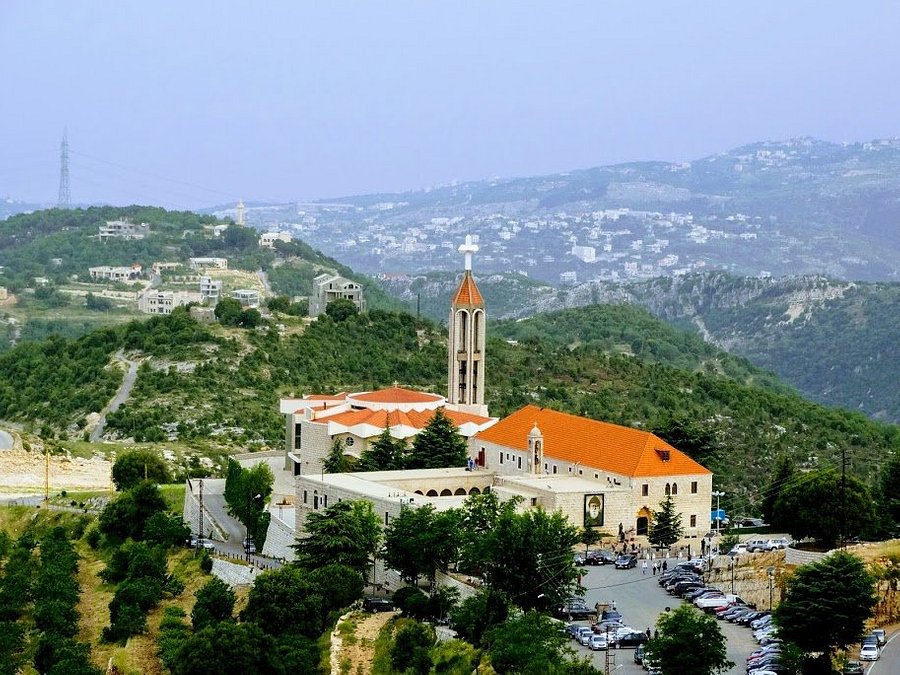
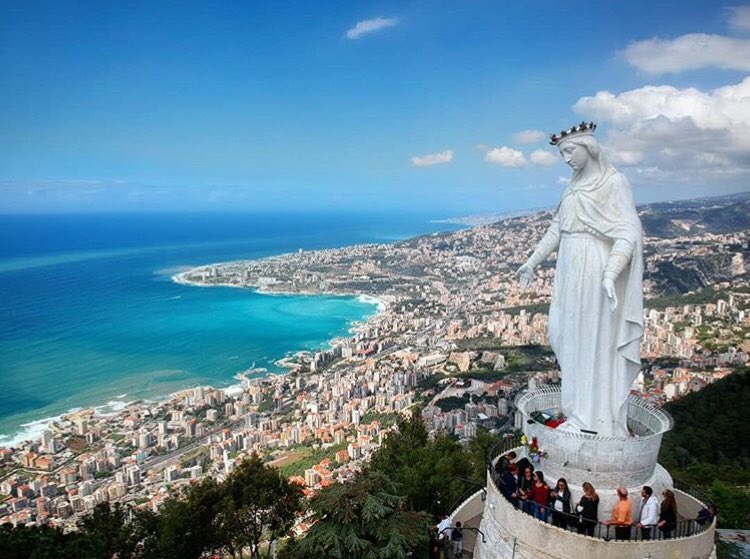
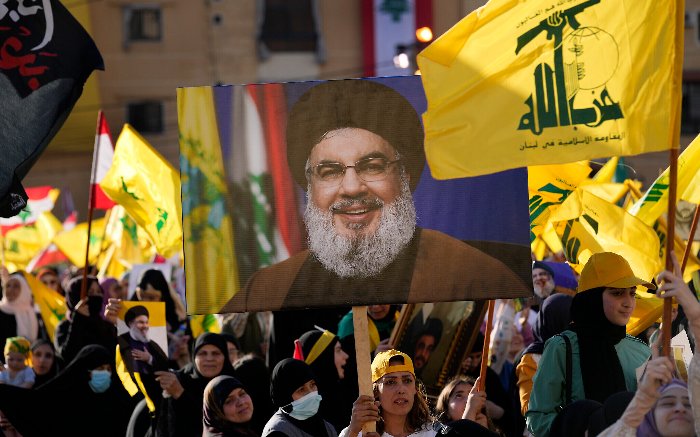
Supporters of Hezbollah with a poster of Hezbollah leader Hussein Nasrallah during an election rally in Beirut, Lebanon in May. Nasrallah has claimed that the investigation into the August 4 explosion is biased and called for the judge leading it to step down, while others claim he is hindering the investigation in order to cover up Hezbollah’s own connections to the blast [Source: AP Photo/Hussein Malla/The Times of Israel]
Pope Francis Commemorates Beirut Explosion, Nuncio Spiteri to Leave Lebanon
Pope Francis spoke this past month about the August 4, 2020 Beirut port explosion, expressing his prayers for those affected by the tragedy and stating, “truth can never be hidden,” in a seeming reference to attempts by various political elites in Lebanon to obstruct the ongoing investigation into the explosion’s origins. The Pope’s comments came in a General Audience held on August 3, 2022, one day before the two-year anniversary of the tragedy.
Here is the full text of the Pope’s comments according to Italian news site Il Sismographo, translated from the original Italian:
“Tomorrow [August 4] is the second anniversary of the explosion of the port of Beirut. My thoughts go out to the families of the victims of that disastrous event and to the dear Lebanese people: I pray that everyone can be consoled by faith and comforted by justice and by truth, which can never be hidden. I hope that Lebanon, with the help of the international community, will continue to walk the path of ‘rebirth,’ remaining faithful to its vocation of being a land of peace and pluralism, where communities of different religions can live in fraternity.”
***
Also in August, the Apostolic Nuncio to Lebanon [the diplomatic representative of the Holy See, equivalent in rank to an Ambassador], Msgr. Joseph Spiteri, ended his mission to the Land of Cedars. Msgr. Spiteri will be moving to a new post in Mexico.
During several meetings and interviews given during the last few days in his post, Spiteri spoke about several key issues, including the plight of refugees in Lebanon, the upcoming presidential elections, and Francis’ pending visit to the country.
In a final visit to the Maronite League (an organization promoting the interests of Maronite Christians in Lebanon, which is closely linked to the Maronite Patriarchate in Bkerké), Spiteri encouraged Lebanon’s leaders to overcome their differences.
“The Vatican still counts on Lebanon’s pluralist message, and I am upbeat that the Lebanese will be able to reach a new formula that saves their distinguished pluralist system,” Spiteri said. He added that “Nothing prevents the state that successfully completed the parliamentary polls from conducting the presidential elections according to the constitutional principles.”
On the issue of the millions of Syrian refugees still in Lebanon, Spiteri noted that the Lebanese government continues to insist that the refugees be repatriated to safe zones in Syria, and stressed that “Lebanese officials should not cease reminding [the West and the United Nations] of this predicament.”
Finally, Spiteri touched on the long-debated, and long-anticipated, papal visit to Lebanon.
“This visit is on the Pope’s agenda,” Nuncio Spiteri said. “He will announce its date when the Vatican departments see that the visit is beneficial for Lebanon.”
The office of the President of Lebanon announced in May that the Pope would be coming to the country in June, but the planned visit then fell through for several reasons, including the uncertain health of the Pope.
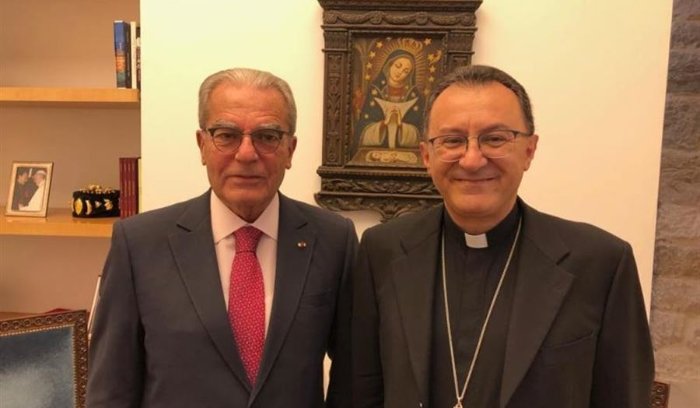
Left, Wadih El-Khazen, Dean of the Maronite General Council, and right, Bishop Joseph Spiteri, the outgoing Apostolic Nuncio to Lebanon, during one of Spiteri’s last meetings in Lebanon as Nuncio, August 21, 2022 [Source: Lebanon National News Agency]
Apostolic Vicar of Beirut Bishop Essayan: “A Small Miracle in This Terrible Moment”
The majority of Catholics in Lebanon belong to the Maronite Church, but there is a group under the direct jurisdiction of Rome: the Vicariate Apostolic of Beirut, established in 1953 and using the Latin Rite, with 137 priests and roughly 18,000 faithful as of 2020.
The Vicar Apostolic of Beirut is Bishop César Essayan.
Born in Achrafiyeh (eastern Beirut) in 1962, Bishop Essayan studied in Rome and was ordained to the priesthood in 1993. He was given the title of Vicar Apostolic in 2016 – a title which signifies that he is a titular bishop in a region where (Latin Rite) dioceses or parishes have not been established.
Bishop Essayan recently gave an interview (in Italian) to Vatican News in which he discussed the situation in Lebanon and what the Catholic Church has done to help in the two years following the August 4 explosion.
Many of the Bishop’s answers to the interviewer’s questions give much-needed context for understanding why, exactly – despite all of the suffering – many in the Church still have hope for Lebanon.
The original interview with Bishop Essayan, published in Italian on the Vatican News website, can be found here.
Vatican News: Your Excellency, how are the Lebanese living today? Have the social wounds from the [August 4] blaze healed?
Bishop César Essayan: The balance is not so positive. There are many of us working to try to heal. Many of those who were wounded [in the explosion have since died. Many houses have been rebuilt but there is work still to be done, for many years. Many people are still waiting to undergo facial plastic surgery for the injuries they sustained. The biggest drama, however, is surrounding the facts, the truth about what occurred – it is getting further and further away.
The judge was initially interfered with. Whether he did a good job or not is not for me to say. In any case, this fact has gradually led the political parties involved to divide the parents of the victims in two: those in favor of the judge and those against. This further clouded the issue, and postponed the possibility of really understanding what happened. So today we have reached a state of profound division, which unfortunately coincides with a division between those who are Christians and those who are Muslims.
On another level, we realize that the consequences of the explosion will also have an effect on the economic crisis: there is little work, people are leaving, the ones who remain are not doing well. There is another division in the population: between those who are earning in dollars and those who are earning in Lebanese lire [pounds]. Those who work in public service are earning in lire and barely make it to the end of the month if they are not helped by relatives abroad. Others such as restaurant owners earn in dollars. Not many people are able to protest against this, because they no longer have the strength. Not to mention the rise in prices due to the war in Ukraine.
And then, again, we must not forget the presence of the Syrian [refugees]. Unfortunately, this is creating tensions with the Lebanese. It should be noted that the Lebanese are being given wrong information: many Lebanese say that the Syrians receive aid in dollars, and they get angry. But this is not true.
In fact, when you go to the bakery there are two lines, the Syrians on one side and the Lebanese on the other. With the Syrians, the whole family comes – if there are five, for example, they take five portions. Usually for the Lebanese it happens that only the father or mother goes, and they take only one portion. These are situations that feed resentment and division. Nothing is easy. It is not just about the explosion at the port of Beirut.
VN: You have spoken of this economic crisis, one of the worst in Lebanese history. In this regard, there have also been several interventions by ulema [Islamic scholars] from the Arab League. But how much space does the international community have to support the country and what are the priority needs of the population at this stage?
CE: They are the usual needs, in reality. In every case, maybe today it is about helping people meet their basic food needs. So we are giving the families some hot food. Then there are the medicines, the hospitals. We’re seeing a huge tragedy. Very few people are able to go there if they need to, because medical costs have increased dramatically, as if we were on the verge of a war. Then there is the area of education.
Today we need to survive. Eighty percent of the population now lives below the poverty line. And these are people who have now grown tired. And yet they go on.
There are problems that have arisen as a result of what happened at the port. We have opened a community center in Beirut where we have a social worker, psychologists (for adults and children). The number of people arriving there is constantly increasing. We used to give about seventy hot meals, now we are giving three hundred. This I say just to give an idea. Those who come to receive medications are increasing month by month: 25-27-29 percent. The lights are almost never on; it all depends on how the generators are working. The state is letting everything go; they think we can fend for ourselves. The population can no longer put up with the state; in short, we are seeing an oppression never before witnessed.
VN: We all remember the mobilization for the emergency in the aftermath of the incident in the port of Beirut, then there was silence in the media. How has the Church proceeded? How have you supported the people over these two years?
CE: It has to be said that the universal Church has never stopped lending a hand to the local Church. With the Ukrainian crisis, aid may have undergone a slight inflection, but the agencies that depend on the Catholic Church have remained always present in the territory of Lebanon and are doing very, very good work. We must thank both the Holy Father, the Secretariat of State, and the Congregation for the Oriental Churches, who are pushing everyone to monitor the situation. There are always those who help, even with cash to support educational institutions, for example. The Oeuvre d’Orient in France, Aid to the Church in Need, the country of Hungary are helping a lot with regard to, for example, the supply of energy through solar technologies. This is helpful for schools, hospitals. Personally I can say that, although the Apostolic Vicariate of the Latins is not rich – indeed, it is poor – from the help we continue to receive we are able to help many many people in turn.
Over a thousand food packs a month, 300 hygiene kits, 300 meals a week in Beirut. We managed to get a mobile clinic that goes north and south, among the Syrian refugee camps, to visit mainly children. In short, there is a small miracle, called the Church. I tell everyone that I am very pessimistic but there is a small miracle that takes place with the outstretched hands of the Church in this terrible moment. It’s very beautiful. She tells us: “I will not leave you alone.” The Lord never leaves us alone, he precedes us, everywhere we go.
I must also add that Pope Francis, the great prophet of our times, with his call to this synodal journey opened up for us paths that allowed for a sharing that we did not experience before. He made us discover that, even though we have lost values on various levels, they are surfacing with those with whom we are close now. These are the values that make us grow: the Lebanese, before entering his home, opens the food package in front of his neighbor’s house and shares with him, because [the neighbor] is in need, like him. These are wonderful things. Perhaps the “great ones” have lost their way, but the poorest among us never have. It is a great lesson of our time.
VN: A few days ago, another fire seemed as though it might consume the destroyed silos that were at the port, whose remains have become a bit of a symbol of what happened two years ago: is there a risk that all traces will be erased, and that the country and the grave situation that it is in will be forgotten?
CE: Perhaps, because the big problem in Lebanon is that it is not possible to tell the truth, to assume one’s responsibilities, to say: okay, we made a mistake, and we ask for forgiveness. We can’t [continue to] always say: let’s act as if nothing had happened, amnesty for all, the corrupt remain in power. No. The independent parliamentarians, the new ones, wanted the silos to be safeguarded as a symbol not only of the explosion, but of all the violence in the world.
Wheat is the basic food for everyone. But there are people who understand nothing and want to destroy everything. Maybe it will happen, too, but one day the truth will reach us all.
[End, interview with Bishop Essayan]

The episcopal ordination of Msgr. César Essayan on October 8, 2016, in Beirut, in the Church of St. Louis of the Capuchins. Essayan was consecrated a bishop by Cardinal Leonardo Sandri, Prefect of the Eastern Churches [Source: Jean Marie Vaas/InfoCatho]
Among those who follow or write about current events in Lebanon, as well as among those who are simply experiencing them first-hand, one theme is often repeated: the country may be able to put its current struggles behind it and blossom once again, but it will require help from the international community.
Another common observation is that there are currently several “competing visions” for the future of Lebanon – as part of a Shia axis led by Hezbollah and Iran, or as part of the Saudi Arabia-led Sunni world, or as an example of a country where people of various faiths, Catholics and Muslims and Druze, can live in harmony.
As much as we may believe in a vision, or in a mission, however, there is often a point of exhaustion, when the circumstances of life prevent us from continuing to work towards it. This, more than anything, is what explains why so many people are now leaving Lebanon, despite their strong family ties and their love for their land and their culture, as well as their faith.
In our latest Unitas: Friends of Lebanon meeting, held on August 26, our colleague Aya Naimeh described the difficulty her family had experienced in trying to pay for an operation for her grandfather’s hip.
“People are sustaining themselves with money from relatives [living abroad],” she said. “My grandpa fell down and had a hip replacement. Relatives abroad paid for the hip operation. I saw a woman asking to remove her husband from the hospital because she didn’t have the 5000 USD to pay for his care.”
Aya also told us that in Lebanon, people above the age of 76 don’t have access to insurance anymore, as insurance companies have stopped insurance policies because of the crisis. Social security has also been stopped for the past 3 years. “If you don’t have somebody helping from abroad there are no solutions for you,” she said. “Nurses don’t get paid as much…they get paid at the official rate. Nurses wouldn’t enter the room because my grandfather had Covid. We had to switch him from one hospital to the other. These are the best hospitals in Lebanon.”
Aya noted that electricity is now costing some families around 10,000,000 Lebanese pounds per month (~6000 USD per month) due to the ongoing blackouts. The money crunch also means that students are now prioritizing work, rather than school. She told us that each university class is either 3 or 4 credits, which each cost 333 USD, money that most students do not have. “We don’t know what it’s going to be like,” she said, talking about the upcoming semester at the university where she works.
“People want to be back,” Aya said. “And they would be back in a second, but the salaries are too low. A good salary is 200 USD. People love their country; most of my friends [returning to Lebanon for summer vacation] postpone leaving Lebanon and going back to their other countries. One week, two weeks. But a basic salary today doesn’t allow you to go to the supermarket one time. It’s a choice between living in Lebanon and having insurance, starting a family… it’s better but it’s not how it was. Many services are now in dollars. This is why they need people from outside to help them.”
Note: If you would like to support this type of writing about Lebanon from a perspective of support for the ancient Christian communities of that region, please consider donating here. Thank you.
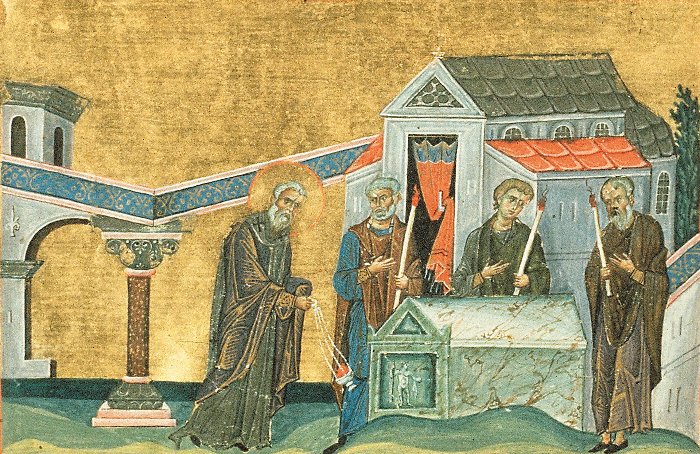
St. Maruthas of Martyropolis, portrayed in the Menologion of Basil II in the Vatican Library [Source: Wikipedia]
A Monk Who Became an Ambassador Between Two Emperors
In a time when the divide between East and West seems to be as wide as it has ever been, it is important to remember the examples of those in history who have sought to “build bridges” in their own time. One such individual is St. Maruthas of Martyropolis, a monk of the Syrian Church who became a bishop in Mesopotamia.
Maruthas was born sometime in the 4th century. Little is known about his early life other than that he was from Syria, which at that time was a borderland between two empires — the Byzantine and the Persian. He was present at the general First Council of Constantinople in 381 and at a Council of Antioch in 383. He is also said to have held two synods at Ctesiphon for the benefit of the Persian Church. As the bishop of Maypherkat (modern-day Silvan, Turkey) he brought into his episcopal city the relics of so many martyrs — most of them victims of the Sassanid Empire in Persia — that it received the surname Martyropolis, “the city of the martyrs.”
As a bishop, Maruthas traveled to Constantinople in the early years of the 5th century to advocate for the Church of Persia, which was undergoing persecution at the time under the Persian King Shapur II.
Several years later, the Byzantine Emperor Theodosius II sent him as an envoy to the court of Yazdegerd I of Persia, where, according to the Catholic Encyclopedia, “in spite of the jealousy and intrigues of the Magi, he won the esteem of King Yezdigerd by his affability, saintly life, and, as is claimed, by his knowledge of medicine.”
Throughout his life, Maruthas worked to bring peace between the two great powers of Constantinople and Persia, while also advocating for Christians who were being persecuted under the Persian regime. In the end, he was indeed successful in bringing about a period of peace.
Maruthas also translated the canons of the Council of Nicaea into Syriac and wrote an anaphora, or Eucharistic Prayer, in Syriac. The same Syriac that he wrote in, and that was likely his native language, is still used by Maronite Catholics and other Eastern-Rite Syriac Christians today.
Please consider becoming a “Friend of Lebanon,” and help us to bring “short-term help” and “long-term hope” to the land where Jesus Christ walked and performed miracles.
As a “Friend of Lebanon,” you will be able to participate in our Zoom calls with the people we are working with in Rome, Beirut, and throughout Lebanon to support Christians in their ancient homeland.
Please consider joining us.
Christopher Hart-Moynihan
Director of Programs
Urbi et Orbi Communications
